Associated Press
JUNEAU — Former Alaska Gov. Bill Walker announced plans Tuesday to run for governor again and said his former labor commissioner, Heidi Drygas, would be his running mate.
Walker dropped his 2018 reelection bid shortly before that year’s election following the resignation of his lieutenant governor, Byron Mallott. Republican Mike Dunleavy won the race and recently filed a letter of intent to seek reelection.
The Dunleavy campaign released a statement, saying Walker’s announcement was not unexpected and that it expected more candidates to get in the race.
“We look forward to the discussion and the debate, and as always, the people of Alaska will decide. We are confident that the critical issues Governor Dunleavy has addressed in his first term will be met with approval by the majority of Alaskans,” the statement said.
Dunleavy has spent much of his term under threat of a recall effort, spurred in 2019 by public anger over deep proposed budget cuts. The recall effort cooled during the pandemic last year.
Former state Rep. Les Gara, a Democrat, has said he’s weighing a run for governor. Libertarian William “Billy” Toien, who ran in 2018, has filed to run.
Next year’s gubernatorial election will be held under a new format, approved by voters in November as part of an election overhaul initiative, in which the top four vote-getters in the primary move to the general election. Ranked-choice voting will be used in the general election. Candidates for governor and lieutenant governor will run as a team for the primary.
Drygas said she and Walker are independents.
Drygas said she was “honored” Walker asked her to join the ticket. She said the state is heading in the wrong direction, “and if I can help Alaska get back on course, then I feel like it’s my duty to serve.”
Walker, who served as governor from 2014 to 2018, said he was prompted to run after hearing concerns from Alaskans that issues facing the state weren’t being fixed.
Debate over fiscal policy and the future of the oil-wealth check paid to residents were key issues when Walker was governor and remain so. A longstanding formula for calculating dividends was last used during Walker’s administration, with Walker in 2016 cutting the amount available for checks amid budget deficits.
The Alaska Supreme Court later ruled that without a constitutional amendment, the dividend must compete for funding like other state programs, and check sizes each year since 2016 have been set by lawmakers.
Dunleavy in 2018 ran on paying a dividend under the longstanding formula and said he supported paying Alaskans the money they missed out on when checks were capped and the formula wasn’t followed. He hasn’t succeeded in persuading lawmakers on either front.
His proposal to restructure the nest-egg permanent fund and place in the state Constitution a new dividend formula is an issue he wants lawmakers to consider during the special session that began Monday. Some legislative leaders say they don’t see the votes for it right now.
Lawmakers proposed a roughly $1,100 dividend for residents this year but tied strings to it and failed to win the needed votes. Dunleavy vetoed the remnant $525 dividend, calling it a “joke.”
As it stands, there is no dividend for this year, and the timing of when the issue may be brought up has been a point of contention. Dunleavy called the special session and sets the agenda. Spokesperson Jeff Turner has said Dunleavy is taking a “phased approach,” and wants a policy decision on a long-term approach to the dividend first.
Walker said he thinks the state should pay the highest dividend it can afford “without taking money out of future generations’ dividends.” The formula needs to be looked at, he said.
“Whether it goes into the constitution or not, I’m still pondering that,” he said of a dividend, adding that he’s concerned “about locking things in too tightly” when there are also other priorities.
Walker quit his 2018 reelection bid after concluding he could not win what had been seen as a three-way race with Dunleavy and Democrat Mark Begich. Walker’s decision came after Mallott, his Democratic lieutenant governor, resigned over what Walker had described as an inappropriate overture to a woman. Mallott died last year.
“When he realized the reaction, he said it was time for him to resign. He did,” Walker said, adding that the resignation came quickly.
It also showed the “zero tolerance we had for that in our administration,” he said. “One time and that was it. You have to lead by example, and that’s certainly what took place on that.”

